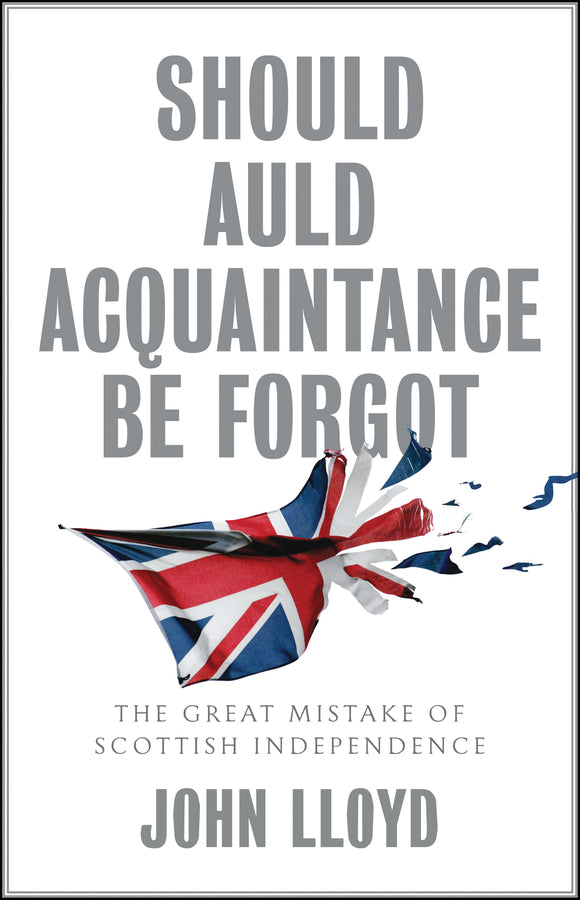Description
Discover 'Should Auld Acquaintance Be Forgot', a thought-provoking exploration of Scotland's turbulent political landscape, penned by acclaimed journalist John Lloyd. This enlightening book delves deep into the ongoing debates around Scottish independence, dissecting the implications of a potential break from the United Kingdom after 300 years of union. With 224 pages of incisive commentary, Lloyd breaks down the misconceptions perpetuated by Scottish nationalists, examining the financial, social, and political ramifications of secession. He argues that the allure of independence could lead to economic instability, disrupting long-standing ties and worsening Scotland's economic prospects in a shaky European Union. As you navigate through the compelling arguments presented in this book, you'll gain a clearer understanding of the consequences that independence could bring, juxtaposed against the benefits of a reformed British union. This brand new edition is published by John Wiley & Sons (UK), ensuring high quality and relevance to current discussions around Scottish nationalism. Ideal for students, political enthusiasts, or anyone looking to understand the complex issues facing Scotland today. Don't miss out on this vital read that confronts the narratives surrounding independence head-on.
Note: Shipping for this item is free. Please allow up to 6 weeks for delivery. Once your order is placed, it cannot be cancelled.
Condition: BRAND NEW
ISBN: 9781509542666
Year: 2020
Publisher: John Wiley & Sons (UK)
Pages: 224
Description:
The Scottish nationalists seek to end the United Kingdom after 300 years of a successful union. Their drive for an independent Scotland is now nearer to success than it has ever been.
Success would mean a diminished Britain and a perilously insecure Scotland. The nationalists have represented the three centuries of union with England as a malign and damaging association for Scotland. The European Union is held out as an alternative and a safeguard for Scotland's future. But the siren call of secession would lure Scotland into a state of radical instability, disrupting ties of work, commerce and kinship and impoverishing the economy. All this with no guarantee of growth in an EU now struggling with a downturn in most of its states and the increasing disaffection of many of its members.
In this incisive and controversial book, journalist John Lloyd cuts through the rhetoric to show that the economic plans of the Scottish National Party are deeply unrealistic; the loss of a subsidy of as much as Ă‚Ĺ10 billion a year from the Treasury would mean large-scale cuts, much deeper than those effected by Westminster; the broadly equal provision of health, social services, education and pensions across the UK would cease, leaving Scotland with the need to recreate many of these systems on its own; and the claim that Scotland wouldĂ‚Â join the most successful of the world's small states - as Denmark, New Zealand and Norway - is no more than an aspiration with little prospect of success.
The alternative to independence is clear: a strong devolution settlement and a joint reform of the British union to modernise the UK'
Note: Shipping for this item is free. Please allow up to 6 weeks for delivery. Once your order is placed, it cannot be cancelled.
Condition: BRAND NEW
ISBN: 9781509542666
Year: 2020
Publisher: John Wiley & Sons (UK)
Pages: 224
Description:
The Scottish nationalists seek to end the United Kingdom after 300 years of a successful union. Their drive for an independent Scotland is now nearer to success than it has ever been.
Success would mean a diminished Britain and a perilously insecure Scotland. The nationalists have represented the three centuries of union with England as a malign and damaging association for Scotland. The European Union is held out as an alternative and a safeguard for Scotland's future. But the siren call of secession would lure Scotland into a state of radical instability, disrupting ties of work, commerce and kinship and impoverishing the economy. All this with no guarantee of growth in an EU now struggling with a downturn in most of its states and the increasing disaffection of many of its members.
In this incisive and controversial book, journalist John Lloyd cuts through the rhetoric to show that the economic plans of the Scottish National Party are deeply unrealistic; the loss of a subsidy of as much as Ă‚Ĺ10 billion a year from the Treasury would mean large-scale cuts, much deeper than those effected by Westminster; the broadly equal provision of health, social services, education and pensions across the UK would cease, leaving Scotland with the need to recreate many of these systems on its own; and the claim that Scotland wouldĂ‚Â join the most successful of the world's small states - as Denmark, New Zealand and Norway - is no more than an aspiration with little prospect of success.
The alternative to independence is clear: a strong devolution settlement and a joint reform of the British union to modernise the UK'

